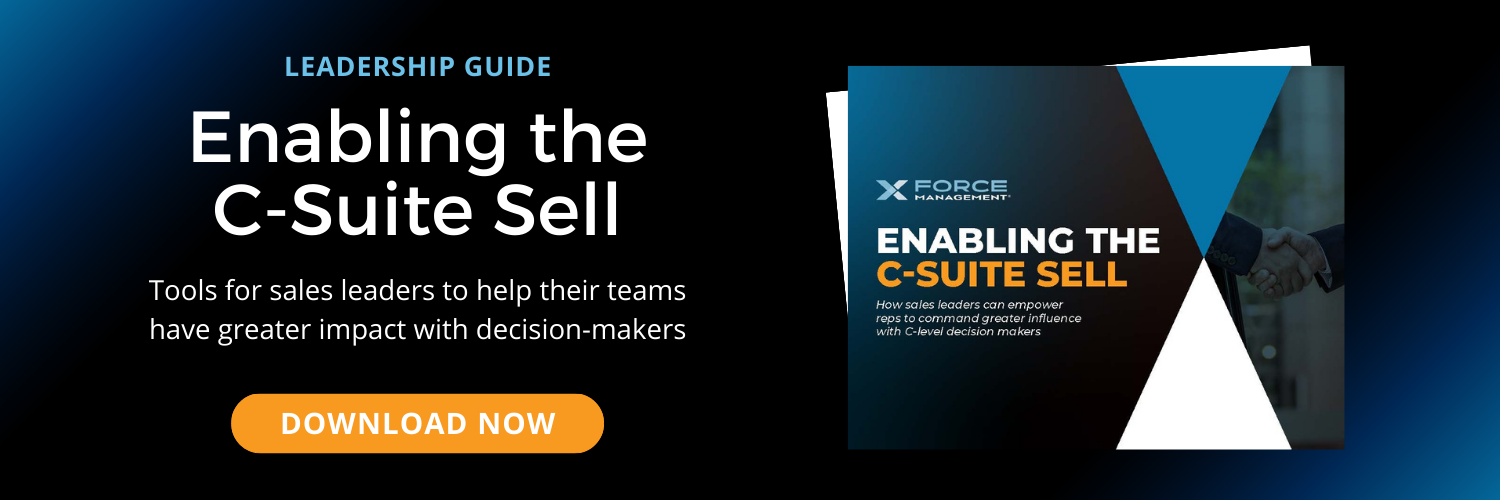
How to Enable Sellers to Win at the C-Suite Level
Categories: Scaling Sales | Economic Change | Selling to the C-Suite
Selling to C-level leaders is a crucial skill for your sales force if you want to grow your average deal size. Especially in today’s environment of economic uncertainty, big price tags are not getting approved without skillful execution of these conversations.
The fundamentals of selling are the same, no matter if you’re selling to a CEO or someone lower in the organization. But there are certain skills that can give sellers more impact and get them in that CEO’s door faster. To close these high-premium deals, sellers need to be transparent, flexible, and genuinely interested in partnering with their buyer for the best outcome.
As a sales leader, there are several tools you can give your sellers that will help equip them for these high-stakes conversations: a strong value message, a deep discovery method, a qualification framework, and a strategy around developing champions. Frank Azzolino recently had a conversation on the Ascender platform sharing strategies that sellers can use in C-suite conversations – a great resource to share with your sales teams to get them thinking about these skills.
A Strong Value Message
Even experienced sellers can be intimidated by a conversation with a C-suite decision-maker on their deal. They know this person’s time is valuable, and that comes with a certain pressure to deliver. One of the best ways you can enable sellers to deliver with confidence is by creating a clearly defined language around the value of your solution, and how it applies to what your buyer is currently prioritizing.
Role-playing and planning are great tools, but no buyer wants to participate in a structured and rehearsed sales conversation. Reps must allow the buyer to guide them to their biggest business issues, especially in a C-level conversation. This is why it’s crucial to ensure your sellers are audible-ready – prepared to apply the value language of your solution to any relevant customer problem, on the fly.
A fully operationalized Value Framework doesn’t just apply to sellers. It provides a unified language to all your cross-functional teams, which is crucial in today’s environment. We often say that negotiation starts at the first handshake, but it also doesn’t end when the deal closes – your account and customer success teams are negotiating your value every day for the future of your relationship with that client. As the economic environment continues to shift, getting that negotiation right with a strong value message is critical to recurring revenue and growth.
A Method For Deep Discovery
We often think of discovery as the early stages of a deal. The truth is that discovery is actually a continuous process – there is never a time in a deal when we’ve learned everything. Deep and respectful discovery is key to the C-level sale, and it starts with a high level of preparedness. When a seller gets to this level, they should be validating their information and appealing to the leader’s personal and organizational goals. If there’s something they could have learned without asking the leader directly, they should already have learned it.
Ensure sellers are approaching discovery with a genuine intellectual curiosity about how the prospect’s business works. The key to great discovery is uncovering problems that may not have been fully visible before. Sellers should not only offer value through your solution; they should add value to the buyer journey, expanding their idea of what is possible.
Here’s how Frank Azzolino put it in his Ascender conversation:
.png?width=700&height=366&name=frank%20quote%201%20(1).png)
A Qualification Framework
A qualification framework like MEDDICC is extremely important when considering the C-suite in deals. Knowing who from C-level will be brought into the deal, and when, can help drive better discovery. This is where the MEDI of MEDDICC comes in:
- What problems are we looking to solve?
- How big is the problem? What are the metrics?
- How important is this? To whom is it the most important?
- How will the decision be made? Who will make the decision?
Keeping these questions in mind will help your sellers not only qualify the deal, but better understand the roles of the individuals they are working with throughout the sales process. This will help them identify who can get them to the C-suite conversation and who can be their champion.
A Strategy for Developing Champions
We often talk about coaches and champions as if they’re a given. What your sellers need to realize is that champions don’t just show up – they must be created. You need to invest in champions, but first you need to distinguish between a coach and a champion. A potential champion:
- Has access to power and influence
- Will lead you to the economic buyer
- Will actively sell on your behalf
- Has a personal vested interest in your success
- Must be identified, developed and tested
Coaches can give sellers valuable information, but do not have access to the power and influence that gets them to C-suite leaders. Once a champion has been identified, sellers need to be clear and direct about their role, confirm that they’re okay with being guided in their internal conversations, and most importantly – support them.
As a leader, you can help sellers support champions by providing great content around your solution and the buying process. This content can be leveraged as education for champions as well as collateral for them to bring to their teams.
Enable Consistent Success with C-Suite Buyers
Consistently winning with C-suite buyers is all about getting your team aligned around a uniform approach. We created an in-depth guide on selling to each member of the executive buying committee - it breaks down the priorities of each C-level role and how to enable your teams to influence decision criteria with each of these vital decision-makers.



